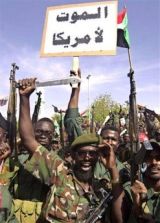Sudan softens its stance on UN troops in Darfur
Jan 8, 2007 (KHARTOUM) — Khartoum has softened its stance on U.N. troops being deployed to Darfur, leaving the door open for blue-helmeted international troops to protect civilians in its vast west, a presidential adviser said on Monday.
 Khartoum has rejected U.N. Security Council Resolution 1706 authorizing some 22,500 U.N. troops and police to take over the Darfur peacekeeping mission from struggling African Union forces who have failed to stem the violence that has killed 200,000 people and driven 2.5 million from their homes.
Khartoum has rejected U.N. Security Council Resolution 1706 authorizing some 22,500 U.N. troops and police to take over the Darfur peacekeeping mission from struggling African Union forces who have failed to stem the violence that has killed 200,000 people and driven 2.5 million from their homes.
A compromise was reached on a hybrid AU-U.N. force, which Khartoum had also rejected.
But on Monday, Presidential Adviser Mustafa Osman Ismail said the AU commander in Darfur could decide to send non-African troops to the violent region if the continent could not provide enough soldiers needed to preserve security.
“The priority is these troops should be African troops,” he told Reuters. “But suppose we fail to have these troops from Africa. In that case we will be ready to accept … non-African troops.”
When asked whether there will be U.N. troops on the ground in Darfur, he told Reuters: “You are right.”
While it is still unclear whether thousands of U.N. troops will be allowed into Darfur to stop the rape, killing and pillage Washington calls genocide, a middle ground seems to have been found to end the diplomatic confrontation between Khartoum and the world body.
Khartoum denies genocide and blames the Western media for exaggerating the conflict.
President Omar Hassan al-Bashir, in his first speech of the new year late on Sunday, also took the most conciliatory tone towards the United Nations in months.
“We agreed with them fully on a role for the United Nations to support the African Union in Darfur,” he said, thanking the United Nations and former U.N. chief Kofi Annan for helping Sudan.
For the first time in many months, he did not repeat his vehement rejection of U.N. troops in Darfur.
CAUTIOUS U.S. REACTION
In Washington, U.S. State Department spokesman Sean McCormack reacted cautiously to Bashir’s comments, saying the United States took them “at face value” and wanted to work with Sudan about U.N. deployments to Darfur.
Under a plan crafted by Annan, a small initial force of U.N. military and civilian forces would go to Darfur, followed by 2,500 troops in a second phase and 10,000 more in a third phase.
“They have indicated a willingness to work in moving forward on phase one and phase two deployments and we are exploring with the Sudanese how to move forward with that and to explore their commitment to those statements,” McCormack told reporters.
However, he called for Sudan to explicitly accept the full deployment of the hybrid force and said it was important “to keep the diplomatic pressure on” the Sudanese government.
The United States had threatened Sudan with unspecified consequences if it failed to allow a small team of U.N. personnel into Darfur and formally accept an international force for the area by the end of last year.
Observers say Bashir feared U.N. troops would arrest any officials likely to be indicted by the International Criminal Court investigating alleged war crimes in Darfur.
But if the presidency has embraced the idea of U.N. forces in Darfur, it may be difficult convincing Sudanese people to accept them.
Even as Ismail spoke, hundreds of angry young Sudanese demonstrated in Khartoum against the United Nations, chanting “down, down U.N.” Some Sudanese Islamic leaders have sworn to take up arms against any U.N. troops they see as invading Darfur’s Muslim lands.
(Reuters)
